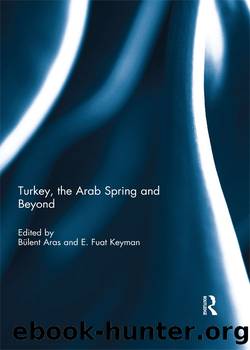Turkey, the Arab Spring and Beyond by Bulent Aras & E. Fuat Keyman

Author:Bulent Aras & E. Fuat Keyman [Aras, Bulent & Keyman, E. Fuat]
Language: eng
Format: epub
ISBN: 9781138643062
Goodreads: 29525076
Publisher: Routledge
Published: 2016-09-12T00:00:00+00:00
Contextualizing the Dynamic of Change
It is impossible to deny âchangeâ, incremental or radical, in the context of the âArab Springâ. No other event has rocked the Middle East to its foundation as much as has these uprisings. Its impact is equal to the discovery of oil in Iran (1908) and Saudi Arabia (1938), the founding of Israel in 1948, EgyptâIsrael Camp David Accords (1979), the Declaration of Principles (1993), 9/11 (2001) and the sacking of Baghdad (2003). Many Arab observers are therefore validated in thinking that only independence from the yoke of colonialism shares historical parity with the Arab uprisings of 2011. Both represent emancipatory moments separated by decades of postcolonial misrule by indigenous elites, of which the likes of Ben Ali, Mohamed Hosni Mubarak and Muâammar Gaddafi were quintessential examples of dictators swept from power by the 2011 protest movementsâunprecedented politically in the Arab Middle East (AME). Hence, a good departure point is to contextualize, as well as reflect on, the still unfolding fervour spawned by the âArab Springâânot as yet possessing the hindsight of historical longue durée.
The postcolonial âstoryâ of political power unfolds through a hegemon, that is, the âover-stated Arab stateâ.3 Ayubi uses this term to record how the Arab state has historically invested itself with all the attributes of power (coercive, financial, legal, tribal, ideological, informational, social, etc.). It has left society with little shared space for normalizing stateâsociety relations, and even less space for societal contests of state power. Since its emergence into territorial existence, the Arab postcolonial stateâs design of this brand of statecraft fulfils what might be called âtotal politicsââthe practice of âtotalizingâ political activity hindering the rise of potential rival centres of power. That is, a field or margin of civic and oppositional existence with a notable blind spot: societal autonomy. This is the space where society strikes back to invent the vocabulary of self-recognition and self-existence, as well as the attendant thought-practice congenial to speaking back and engaging political power. Therein lies the promise of negotiating the substance of change, its terms and its strategies. In their struggles to effect change, Arab societies have historically capitalized on the space vacated by state power. In every retreat/absence by the state, there emerges the potential for advancement/presence by society, as if (state) âzero-powerâ equates with (societal) âpositive powerâ, at least potentially.
One key idea advanced here is that the postcolonial political organization that preceded the Arab Spring became too ossified: elitist, exclusionary, reliant on distribution or coercion as means of reproducing power. In this regard, the only distinction to be noted is that republican systemsâ reliance on coercion far outweighs that of monarchies, especially GCC member states. Integral to political organization was the absence of serious safety valves that allow society channels of venting anger. âExplosionâ was a matter of time. For example, in December 2010, a Tunisia fruit vendor, Mohamed Bouazizi, became the trigger.4 Thus, any narration of the context of the Arab Spring would be incomplete without accounting for the state of political organization in the pre-Arab Spring political setting, as argued below.
Download
This site does not store any files on its server. We only index and link to content provided by other sites. Please contact the content providers to delete copyright contents if any and email us, we'll remove relevant links or contents immediately.
What's Done in Darkness by Kayla Perrin(26800)
The Ultimate Python Exercise Book: 700 Practical Exercises for Beginners with Quiz Questions by Copy(20664)
De Souza H. Master the Age of Artificial Intelligences. The Basic Guide...2024 by Unknown(20442)
D:\Jan\FTP\HOL\Work\Alien Breed - Tower Assault CD32 Alien Breed II - The Horror Continues Manual 1.jpg by PDFCreator(20439)
The Fifty Shades Trilogy & Grey by E L James(19300)
Shot Through the Heart: DI Grace Fisher 2 by Isabelle Grey(19258)
Shot Through the Heart by Mercy Celeste(19124)
Wolf & Parchment: New Theory Spice & Wolf, Vol. 10 by Isuna Hasekura and Jyuu Ayakura(17291)
Python GUI Applications using PyQt5 : The hands-on guide to build apps with Python by Verdugo Leire(17225)
Peren F. Statistics for Business and Economics...Essential Formulas 3ed 2025 by Unknown(17070)
Wolf & Parchment: New Theory Spice & Wolf, Vol. 03 by Isuna Hasekura and Jyuu Ayakura & Jyuu Ayakura(16995)
Wolf & Parchment: New Theory Spice & Wolf, Vol. 01 by Isuna Hasekura and Jyuu Ayakura & Jyuu Ayakura(16611)
The Subtle Art of Not Giving a F*ck by Mark Manson(14608)
The 3rd Cycle of the Betrayed Series Collection: Extremely Controversial Historical Thrillers (Betrayed Series Boxed set) by McCray Carolyn(14305)
Stepbrother Stories 2 - 21 Taboo Story Collection (Brother Sister Stepbrother Stepsister Taboo Pseudo Incest Family Virgin Creampie Pregnant Forced Pregnancy Breeding) by Roxi Harding(13964)
Scorched Earth by Nick Kyme(12961)
Drei Generationen auf dem Jakobsweg by Stein Pia(11142)
Suna by Ziefle Pia(11065)
Scythe by Neal Shusterman(10553)
